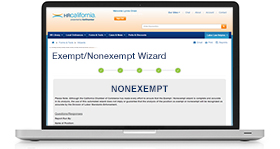California Exempt and Nonexempt Employees
Understanding Exempt Employees vs. Nonexempt Employees in California
Some of the most significant class action lawsuits have resulted from an employer's misclassifying nonexempt employees as though they were exempt from California overtime. This section discusses the exempt and nonexempt classifications with reference to California standards for minimum salary and job responsibilities.
Exempt vs. Nonexempt California Employee Classification
Strict Duties Test
To be considered an exempt employee in California, an employee must generally meet a strict duties test. For most exemptions, more than 50 percent of an employee's time must be spent performing exempt job duties.
Job Title Irrelevant
Job titles do not determine a California employee's exempt or nonexempt status. An employee with an impressive job title may not qualify as an exempt employee if their actual duties do not meet the requirements for one of the exemptions.
Try the Exempt/Nonexempt Wizard >
The Exempt/Nonexempt Wizard walks you through a series of questions to help you determine if a job position should be classified as exempt or nonexempt.
Labor Commissioner's Determination
To determine whether the California employee is primarily engaged in exempt work, the California's Labor Commissioner examines the work performed by the employee during the workweek.
Salary Considerations
California Exempt employees generally must earn a minimum monthly salary of at least two times the state minimum wage for full time employment. Simply paying an employee a salary does not make them exempt, nor does it change any requirements for compliance with wage and hour laws.
Discretion and Independent Judgment
Most California employees classified as exempt customarily and regularly exercise discretion and independent judgment in their jobs. Discretion and independent judgment involve comparing and evaluating possible courses of action and deciding after considering various possibilities.
Federal Salary Basis Rules
While California law has more rigorous standards than federal law, federal law still warrants some attention. The Department of Labor Standards Enforcement (DLSE) has indicated that, although there are differences between the state and federal exemption standards, the federal regulations may serve as a guide where there is no conflict.
Deductions from Salary of Exempt Employees
The "salary test" required for exempt employees requires that the full weekly salary be paid for any week in which work is performed, with only very limited exceptions. As a result, deductions from an exempt employee's salary are limited.
Impermissible Deductions
There are a few examples of impermissible deductions, including:
- Unavailability of Work Do not make deductions when work is unavailable because of the business’ operational requirements, provided exempt employees are ready, willing and able to work. Thus, if July 4 falls on a Tuesday and you shut down the business for the balance of the week, any exempt employee who worked on Monday of that week is entitled to a full week's pay.
State vs. Federal Exemptions
The federal and state governments differ in applying exemptions to employees performing specific job duties.
Exemptions for California Employees
Executive Exemption
The executive exemption is usually applied to managerial employees. However, managers still have to meet the requirements for the exemption. If they do not, they must be classified as nonexempt unless they can meet one of the other exemptions.
Administrative Exemption
The administrative exemption applies to a wide variety of employees. However, not all employees whose jobs involve administrative work will meet the administrative exemption and thus may need to be classified as nonexempt.
Professional Employee Exemption
Although an employee commonly may be considered a "professional", specific legal requirements must be met to qualify for the professional exemption.
Computer Professional Exemption
Certain computer professionals are exempt from overtime if they are engaged in specific high-level computer-related duties, such as systems analysis or software design. The law requires a specific hourly, monthly, or yearly salary, which is set by the state of California each year.
Salesperson Exemption
To define exempt vs. nonexempt status, salespeople are grouped into two categories: outside and inside salespeople. Different tests for exempt status apply to each one.
Artist Exemption
Relatively few individuals qualify for exemption as members of artistic professions in California, since most of those who have sufficient control over the nature of their own work and over their work hours are self-employed.
Related Resources
CalChamber members have access to several tools and services that help those who manage human resources to work through exempt and nonexempt-related issues, including:
Exempt/Nonexempt Wizard »
The Exempt/Nonexempt Wizard is a tool that helps when judging between exempt vs. nonexempt. The tool walks you through a series of questions to help you determine if a job position should be classified as exempt or nonexempt.
Exempt vs. Nonexempt Forms & Checklists
Exempt Analysis Worksheet - Administrative Exemption »
Use this worksheet to help evaluate the exempt vs nonexempt status for your administrative employees.
Exempt Analysis Worksheet - Computer Professional Exemption »
Use this worksheet to help evaluate the exempt or nonexempt status for your computer professionals.
Exempt Analysis Worksheet - Executive Managerial Exemption »
Use this worksheet to help evaluate the exempt or nonexempt status for your managers or executives.
Exempt Analysis Worksheet - Professional Exemption »
Use this worksheet to help evaluate the exempt or nonexempt status for your professional employees (such as teachers, doctors or attorneys).
Exempt Analysis Worksheet - Salesperson Exemption »
Use this worksheet to help evaluate the exempt or nonexempt status for your sales staff.
Job Description »
Use this form as a guide to help you define duties for an open position for which you are recruiting a new employee or to clarify existing job duties, skills or essential functions of the job.


